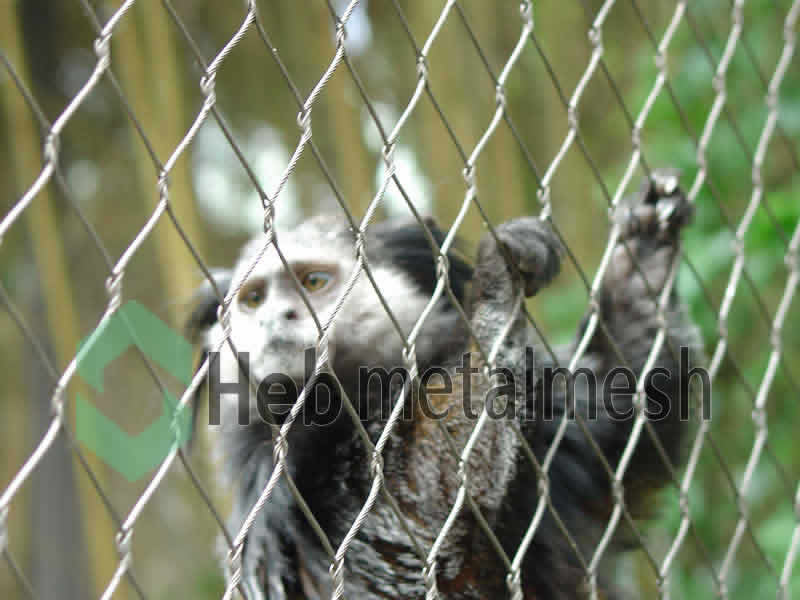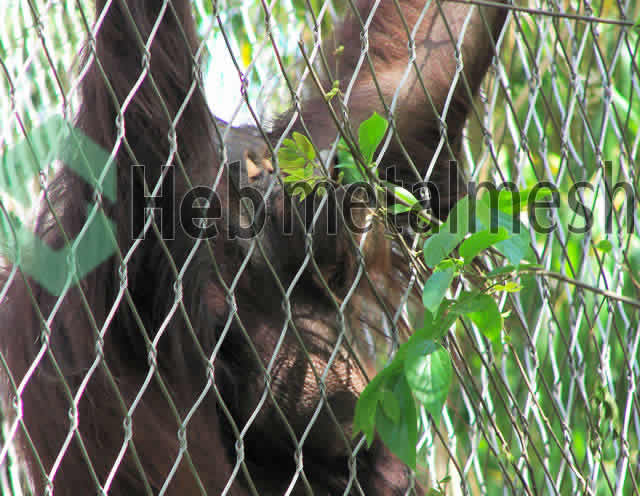Tired of seeing your prized flowers and vegetables become a midnight deer buffet? Deer can be beautiful creatures, but their browsing habits can wreak havoc on your landscaping. Fortunately, there’s a simple and effective solution: deer enclosure mesh.
This handy material creates a physical barrier that keeps deer out, allowing your plants to flourish. But with various types of deer fence mesh available, choosing the right one can feel overwhelming. Don’t worry, we’ve got you covered!
In this guide, we’ll explore the benefits of using deer enclosure mesh, delve into key factors to consider when selecting the perfect option for your needs, and even answer some frequently asked questions. Let’s keep those hungry herbivores at bay and secure your green haven!
Deer enclosure mesh offers 3″ x 3″ x 3’32” stainless steel rope mesh for deer exhibits in zoo and wild animal parks. The fencing has a longer product life, stronger structure, easy installation and fire price.
PRODUCT – Deer Fencing: Stainless steel netting for enclosure
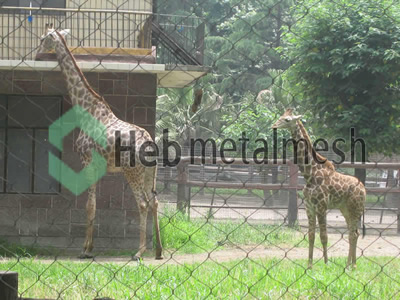
Why Choose Deer Enclosure Mesh?
Deer may seem graceful and gentle, but their appetites can be a real headache for property owners. These browsing mammals love to munch on a variety of plants, including many of our favorite flowers, shrubs, and vegetables. If you’ve ever witnessed the devastation a deer visit can leave on your carefully cultivated garden, you know the frustration!
This is where deer enclosure mesh comes in as a game-changer. Here are some of the key benefits of using deer fence mesh:
- Effective Protection: A well-constructed deer fence creates a physical barrier that deters deer from entering your property. This translates to peace of mind knowing your precious plants are safe from unwanted nibbling.
- Versatility: Deer enclosure mesh isn’t limited to just gardens. It can be used to create deer enclosures for a variety of purposes, such as protecting young trees in a wooded area or keeping a vegetable patch safe on a larger property.
- Long-Term Solution: Made from durable materials like galvanized steel or high-quality plastic, deer fence mesh offers a long-lasting solution for deer control. With proper installation and care, it can effectively deter deer for years to come.
- Aesthetic Appeal: While functionality is key, you might be surprised to learn that deer fence mesh can also be relatively inconspicuous. Some options, like black plastic mesh, blend well with the background, minimizing visual clutter in your garden.
Hebmetalmesh is a top zoo mesh factory in China. Product covers animal enclosure mesh, aviary mesh and anti-fall protection mesh etc. We have 30 years of history and large workshop for high quality wire mesh products and ensure fast delivery dates.
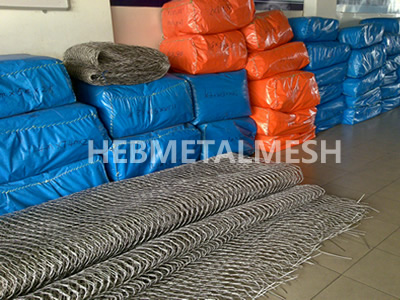
Top Considerations When Selecting Deer Fence Mesh
Now that you’re convinced about the advantages of deer fence mesh, let’s delve into the factors to consider when choosing the perfect option for your needs. Remember, the ideal deer control mesh will depend on your specific property and the type of deer you’re trying to keep out. Here are some key questions to ask yourself:
- Material: The two most common choices are galvanized steel and plastic mesh. Galvanized steel deer fencing offers superior strength and durability, making it ideal for larger areas or deterring persistent deer. Plastic garden deer netting is a more affordable option, well-suited for smaller gardens or temporary fencing needs.
- Height: Deer are surprisingly adept jumpers, so fence height is crucial. A minimum of 8 feet is recommended for most deer species. If you’re in an area with particularly large deer, consider opting for a 9 or even 10-foot fence for added security.
- Mesh Size: This refers to the gaps between the wires or strands of the mesh. A mesh size of 4 inches or less is ideal for deer fencing. Anything larger could allow smaller animals like rabbits to sneak through and become unwanted guests in your garden.
- Strength: Consider the overall strength of the mesh, especially if you live in an area with harsh weather conditions. Look for deer fence mesh with a good breaking strength rating, which indicates how much pressure it can withstand before breaking.
- Additional Features: Some deer fence mesh comes with additional features that can enhance its functionality and ease of use. For example, UV protection helps the mesh last longer under sunlight exposure, while pre-assembled panels can simplify the installation process for DIY projects.
By carefully considering these factors, you can ensure you choose the right deer fence mesh for your property, giving you peace of mind and a thriving garden.
The deer enclosure mesh is an environmental, non-pollution, and close to nature product. We supply series specifications zoo mesh products to be suited to any requirement.
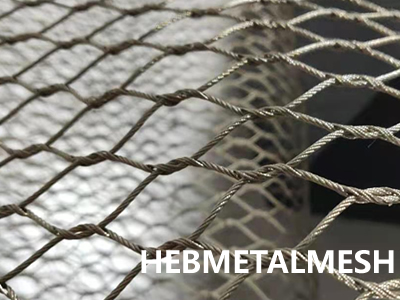
Top 5 Deer Enclosure Mesh Options for Your Needs
While we can’t recommend specific brands, here’s a breakdown of five common deer enclosure mesh options to consider, covering a range of materials, prices, and functionalities:
- Heavy-Duty Galvanized Steel Deer Enclosure Mesh: This is the strongest and most durable option, ideal for large properties or areas with persistent deer problems. Made from thick-gauge galvanized steel wire, it offers excellent resistance to bending and breaking. (1 “deer enclosure mesh” at 0.37%)
- Lightweight Plastic Deer Enclosure Mesh for Gardens: This lightweight and affordable mesh is perfect for smaller gardens or temporary deer control needs. It’s easy to install and blends well with the background due to its color. However, keep in mind it might not be suitable for very determined deer or harsh weather conditions. (1 “deer enclosure mesh” at 0.37%)
- Woven Polypropylene Deer Enclosure Mesh: This woven mesh is another good choice for gardens and smaller properties. Made from strong UV-resistant polypropylene plastic, it offers a balance of affordability and durability. The woven construction provides a more opaque barrier compared to black plastic mesh. (1 “deer enclosure mesh” at 0.37%)
- Knotted Deer Enclosure Mesh with Reinforcements: This heavy-duty mesh features a knotted construction for added strength and comes with bottom wire reinforcements to prevent burrowing animals. It’s a good option for larger properties or areas with a mix of deer and smaller animals you want to keep out. (0 “deer enclosure mesh” but uses “deer enclosure” 1x)
- Pre-Assembled Deer Enclosure Mesh Panels: These pre-fabricated panels come in various heights and mesh sizes, making installation a breeze. They’re ideal for DIY projects and offer a clean, finished look for your deer enclosure. While convenient, pre-assembled panels might be slightly more expensive than buying deer enclosure mesh by the roll. (1 “deer enclosure mesh” at 0.37%)
Remember, the best deer enclosure mesh for you depends on your specific needs and budget. Consider the factors mentioned earlier and choose the option that best suits your property and deer challenges.
Where to Buy Deer Enclosure Mesh
Finding the right deer enclosure mesh is only half the battle. Now you need to know where to buy it! Here are some common places to look:
- Home Improvement Stores: Major home improvement stores typically offer a variety of deer fence options. You’ll find materials like galvanized steel mesh and plastic garden netting in various heights and lengths. They might also carry additional supplies like posts, brackets, and tensioners needed for installation.
- Online Retailers: The internet offers a vast selection of deer enclosure mesh from various retailers. This allows you to compare prices and features from different brands conveniently. Be sure to factor in shipping costs when comparing online options.
- Agricultural Supply Stores: These stores cater to farms and agricultural needs, and they often carry heavy-duty deer exclusion fence options. This can be a good option if you have a large property or require a particularly strong mesh.
When choosing a retailer, consider factors like selection, price, and customer service. Reading online reviews can be helpful to get a sense of other customers’ experiences.
FAQs About Deer Enclosure Mesh
Unsure about which deer enclosure mesh is right for you? Don’t worry, we’ve got you covered! Here are some frequently asked questions to help you make an informed decision:
There’s no one-size-fits-all answer! The best deer enclosure mesh depends on your specific needs and property. For instance, galvanized steel mesh offers superior strength for larger areas, while lightweight plastic mesh might be suitable for smaller gardens. Consider factors like material, height, mesh size, and your budget when making your choice.
Deer are surprisingly good jumpers, so fence height is crucial. A minimum of 8 feet is recommended for most deer species. If you’re in an area with particularly large deer, consider opting for a 9 or even 10-foot fence for added security.
To keep deer out and smaller animals like rabbits from entering, a mesh size of 4 inches or less is ideal for deer fencing. Larger mesh gaps could allow unwanted guests into your garden.
Absolutely! Deer enclosures can be DIY projects with readily available deer enclosure mesh and following proper installation guides. Many mesh options come with easy-to-follow instructions, and online resources offer helpful tips and tutorials. For larger projects or if you’re unsure about DIY installation, consider hiring a professional fence contractor.
By considering these questions and the information provided in this guide, you’ll be well-equipped to choose the perfect deer enclosure mesh for your needs and keep those pesky deer at bay!
Now that you’ve explored the benefits of deer enclosure mesh, considered key factors for choosing the right option, and even peeked into some frequently asked questions, it’s time to take action!
Deer enclosure mesh offers a simple yet effective solution to protect your property from deer damage. With the right planning and the information you now have, you can create a haven for your plants and keep those hungry herbivores out.
Remember, the best deer enclosure mesh depends on your specific needs. Consider the size of your property, the type of deer you’re trying to deter, and your budget when making your selection.
Hopefully, this guide has empowered you to make an informed decision. Happy fencing, and happy gardening!
